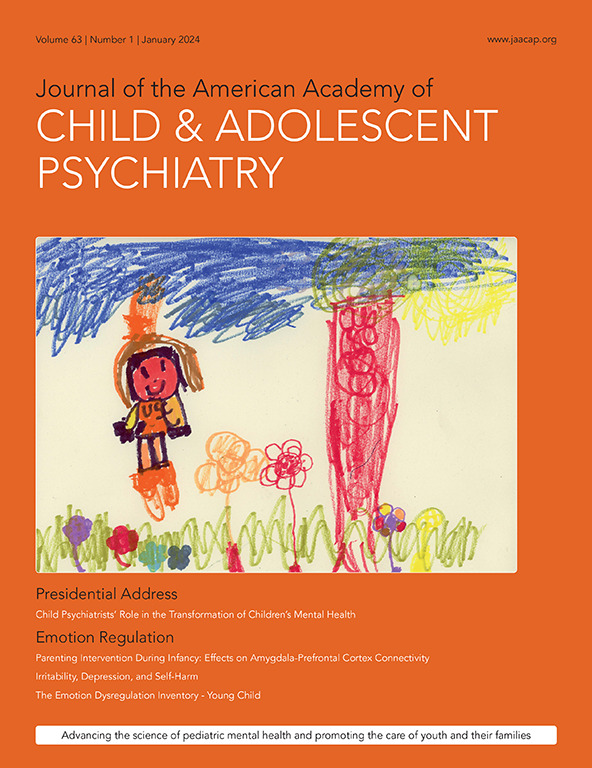Systematic Review: The Psychosocial Impacts of Autism-Related Genetic Testing.
IF 9.2
1区 医学
Q1 PEDIATRICS
Journal of the American Academy of Child and Adolescent Psychiatry
Pub Date : 2025-07-03
DOI:10.1016/j.jaac.2025.06.024
引用次数: 0
Abstract
OBJECTIVE To perform a systematic literature review of the psychosocial impacts on parents and autistic people of receiving autism-related genetic test results. METHOD Systematic searches of MEDLINE, PsycINFO, CINAHL, Web of Science Core Collection, Sociological Index, and Scopus were conducted for articles appearing through October 27, 2024. The authors screened 3,606 articles. The quality of the included articles was assessed with the QuADS appraisal tool. RESULTS Twenty-two articles met inclusion criteria. Across research and clinical settings, articles assessed impacts of receiving actual (n=18) or hypothetical (n=4) genetic test results. Twenty articles assessed impacts on parents and prospective parents, while two assessed impacts on autistic adults. Psychological impacts of receiving results varied and included relief, peace of mind, reduced guilt, disappointment, fear, frustration, stress, blame, and guilt. Comparison of the frequencies of these responses was limited by heterogeneous assessment methods, variable reporting formats, and inconsistent outcome measures across studies. Receiving results sometimes confirmed diagnoses, led to altered care plans, influenced family planning, or impacted the decision to end or continue a pregnancy. Most articles reported low-to-mild or highly variable satisfaction with the testing experience. Studies of autistic adults reported strong concerns about testing without consent and discriminatory uses of genetics. CONCLUSION Impacts on parents and prospective parents appear relatively modest, albeit with mixed valences-a finding broadly similar to return-of-results studies for other complex genetic conditions. Although the findings of the two studies of autistic adults differ substantially, they suggest that autistic people and current and prospective parents of autistic children may have significantly different experiences and perspectives. Clinicians should recognize these differences and help parents understand and weigh them in decision-making.系统综述:自闭症相关基因检测的社会心理影响。
目的对接受自闭症相关基因检测结果对父母和自闭症患者的心理社会影响进行系统的文献综述。方法系统检索2024年10月27日前发表的论文,检索MEDLINE、PsycINFO、CINAHL、Web of Science Core Collection、Sociological Index和Scopus。作者筛选了3606篇文章。采用QuADS评估工具评估纳入文章的质量。结果22篇文章符合纳入标准。在研究和临床设置中,文章评估了接受实际(n=18)或假设(n=4)基因检测结果的影响。20篇文章评估了对父母和准父母的影响,而两篇文章评估了对自闭症成年人的影响。接受结果的心理影响是多种多样的,包括缓解、内心平静、减少内疚、失望、恐惧、挫折、压力、责备和内疚。这些反应频率的比较受到不同评估方法、不同报告格式和不同研究结果测量不一致的限制。接收结果有时会证实诊断,导致改变护理计划,影响计划生育,或影响终止或继续妊娠的决定。大多数文章报告了对测试体验的低到轻度或高度可变的满意度。对成年自闭症患者的研究报告强烈关注未经同意的测试和歧视性使用基因。结论:对父母和未来父母的影响相对较小,尽管价格不一——这一发现与其他复杂遗传条件的研究结果大致相似。尽管这两项针对成年自闭症患者的研究结果存在很大差异,但它们表明,自闭症患者与自闭症儿童的现任和未来父母可能有着显著不同的经历和观点。临床医生应该认识到这些差异,并帮助家长理解和权衡他们的决策。
本文章由计算机程序翻译,如有差异,请以英文原文为准。
求助全文
约1分钟内获得全文
求助全文
来源期刊
CiteScore
21.00
自引率
1.50%
发文量
1383
审稿时长
53 days
期刊介绍:
The Journal of the American Academy of Child & Adolescent Psychiatry (JAACAP) is dedicated to advancing the field of child and adolescent psychiatry through the publication of original research and papers of theoretical, scientific, and clinical significance. Our primary focus is on the mental health of children, adolescents, and families.
We welcome unpublished manuscripts that explore various perspectives, ranging from genetic, epidemiological, neurobiological, and psychopathological research, to cognitive, behavioral, psychodynamic, and other psychotherapeutic investigations. We also encourage submissions that delve into parent-child, interpersonal, and family research, as well as clinical and empirical studies conducted in inpatient, outpatient, consultation-liaison, and school-based settings.
In addition to publishing research, we aim to promote the well-being of children and families by featuring scholarly papers on topics such as health policy, legislation, advocacy, culture, society, and service provision in relation to mental health.
At JAACAP, we strive to foster collaboration and dialogue among researchers, clinicians, and policy-makers in order to enhance our understanding and approach to child and adolescent mental health.

 求助内容:
求助内容: 应助结果提醒方式:
应助结果提醒方式:


